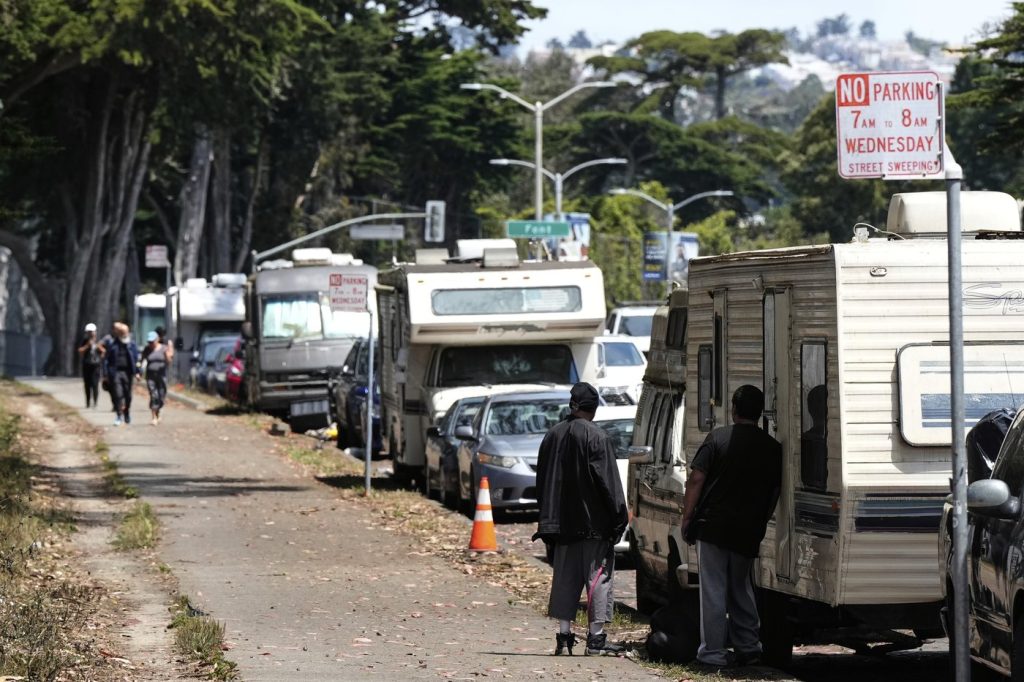SAN FRANCISCO (AP) – The city of San Francisco is poised to implement a new policy that will prohibit homeless individuals from residing in recreational vehicles (RVs) as part of an effort to maintain clear sidewalks and reduce trash accumulation. This policy, which is slated for final approval by city supervisors, directly addresses the estimated 400 RVs currently inhabiting the streets of the city, which has a population of approximately 800,000.
Proponents of the policy, including Mayor Daniel Lurie, argue that RVs are not an appropriate long-term solution for housing, particularly in a city facing a severe affordable housing crisis. Kunal Modi, an advisor to the mayor, emphasized the city's responsibility to provide shelter while ensuring that this support is offered in safe, indoor environments rather than on public roadways. The policy aims to assist vulnerable populations, including immigrant families and individuals unable to afford conventional housing options.
However, critics of the initiative argue that it is inhumane to forcibly displace people from their only homes in exchange for uncertain housing opportunities, especially when the supply of affordable units falls woefully short of current demand. Jennifer Friedenbach, executive director of the Coalition on Homelessness, voiced concerns regarding the lack of clarity in an accompanying permit program, which is intended to exempt certain RV residents from parking restrictions if they are cooperating with outreach efforts to secure housing. Friedenbach warned that the policy could lead to a loss of RV homes for many, disproportionately impacting those with significant needs, such as individuals sleeping on sidewalks.
San Francisco, like many other U.S. cities, has experienced a surge in the number of individuals living in vehicles and RVs due to rising living costs. Mayor Lurie's commitment to cleaning up city streets includes restricting oversized vehicles under a growing trend of compelling homeless individuals to accept shelter arrangements or face penalties. The proposed policy dictates a strict two-hour parking limit citywide for RVs and oversized vehicles exceeding specified dimensions, regardless of their use as living quarters.
The proposed permit program aims to provide exemptions from these parking limits for RV residents who were registered with the city as of May, on the condition that they accept housing offers and relinquish their RVs upon moving indoors. The city has allocated over half a million dollars to facilitate the purchase of RVs from residents at a rate of $175 per foot. The permits offered will last six months, and individuals who begin living in RVs after the May cut-off will not qualify for these exemptions.
Testimonies from residents, such as Carlos Perez, a 55-year-old produce deliveryman, highlighted the struggles faced by those living in RVs due to exorbitant housing costs. Perez, who supports his disabled brother and maintains a clean environment around his RV in the Bayview neighborhood, expressed the difficulty of finding affordable housing. Another RV resident, referred to as Zach, shared that he turned to living in an RV after recognizing that no amount of hard work would suffice to cover high rents. He emphasized that while he maintains a clean living space and prefers his current lifestyle to a shelter, he recognizes the potential for obtaining a permit.
The issue of inadequate safe parking options for RV dwellers is compounded by the city's closure of its only RV lot in April, a decision made due to the high annual costs and its failure to transition individuals into stable housing. Mayor Lurie's proposal includes increased funding for parking enforcement and an additional $11 million to assist a limited number of households in accessing subsidized housing for a few years. While officials acknowledge the need for more comprehensive solutions, they also point to available hotel vouchers and housing subsidies as potential resources for those affected by the new policy.
Erica Kisch, CEO of nonprofit Compass Family Services, voiced a nuanced perspective, expressing appreciation for the additional resources while cautioning against the punitive nature of the initiative. Kisch highlighted the urgent need for better solutions for families, seniors, and all individuals living in vehicles, asserting that San Francisco has a moral obligation to improve living conditions for those most vulnerable in its population.










